Misyon Online - May-June 2011
Pulong ng Editor

Misyon and My Vocation
By Fr Christopher F. Amoroso MSP
MSP missionary to the Diocese of Okinawa, Japan.
The author ordained priest on 4 October 2007 and appointed Assistant Vocation Director for the Mission Society of the Philippines (MSP) in Luzon. Later he was sent to the Diocese of Naha, Okinawa, Japan to work with Filipino Migrants and will be two years there on 20 June.’ I go to the different islands of Okinawa to look for the migrants and see what the Diocese can do for them, especially with regard to their spiritual life’.
DRIFTING AWAY FROM THE FAITH
I was baptized into the Catholic faith by Columban Fr David Clay on 6 May 1972 at St Sebastian Catholic Church in San Narciso, Zambales. My family were nominal Catholics. Even so, I got my first catechism lessons from my parents who simply taught us, six siblings, to love each other and help other people. My father would tell me that God is everywhere, so we can pray anywhere we go.
In April 1987, when I was in second year high school, I was converted to a Bible-based Christian congregation. My parents didn’t object because for them, as long as I would be taught to live a good life, it was alright. The fundamental teachings of this Christ-centered congregation became part of my active spiritual life. I shared my new-found faith in school and imposed the literal biblical guidelines on my day-to-day undertakings. Even so, I was weak in dealing with temptations. So my life became an endless series of tumbling down and standing up. The only consolation I got each time I fell was God’s word, ‘No one is perfect, not even one’. The most important thing for me at that time was to never give up trying to be good.
‘I WANT TO BECOME A PRIEST!’
Before I graduated from college in 1993, my sixth year with this congregation, I felt an emptiness in my spiritual life. I couldn’t find meaning anymore in what I did. I couldn’t fill the vacuum in my heart just by going to church. I found myself making excuses not to attend church services until I totally stopped going. Gambling, solitary activities and other fun-filled activities with friends became more attractive to me.
In the middle of all this, I was continually asking God for direction. Then one hot summer day, after riding a tricycle from my village to my workplace in San Narciso town, I unconsciously found myself walking towards St Sebastian Catholic Church. I knelt at one of the back pews with clasped hands and in tears, staring blankly into the face of the crucified image of Christ. I can’t remember anymore how many times this happened on successive days. What I clearly remember are the questions I was asking God while I prayed:. ‘Why am I here, Lord? What do you want from me?’ I always ended with this words, ‘May your will be done, Lord.’ On one occasion the thought of the priesthood just popped into my mind but I didn’t pay much attention to it.
I continued to experience an emptiness in life that got so intense I could not bear it any longer. I deliberately asked God for a sign. That time I was living with relatives who were both teachers at Central School in San Narciso. I did household chores and school-related works while helping my aunt in her little apparel business and looking for a job at the same time.
Fr Chris with the Filipino Community in Miyako Island
In the midst of my confusion I told my aunt, a devout Catholic, about the thought of priesthood. She just shrugged her shoulders and sent me to their ‘mountain house’ in Balaybay, Castillejos, for a few days. There I experienced a tormenting silence and dryness in spirit. That added to my confusion and frustration. However hard I prayed, I got no answer whatsoever and my feelings, which only God and I knew about, continued. To the mountain and back to my aunt’s house, o the mountain and back to my aunt’s house a pattern that kept repeating. I felt desperate but didn’t stop praying for God’s direction. I thought too that maybe because I had converted to another religion my aunt hadn’t believed me.
SIGNS OF GOD’S CALL
First sign. One day as I was cleaning my aunt’s house, I saw some magazines under a small study table. They had been there since I arrived but had only then caught my attention. Some were copies of MISYON published by the Society of St Columban. I opened one and came across the story of Brother Richie Fernando, a Jesuit scholastic (student for the priesthood) who died serving young person with physical disabilities in Phnom Penh, Cambodia. One day a student threw a grenade into a class of handicapped students. Brother Richie tried to stop him by embracing him but was hit at the base of his skull and in his back by the exploding grenade. He was able to save the students but it took his own life.
The author after his ordination as deacon with Bishop Florentino G. Lavarias of Iba.
It was terrible. After reading about his ordeal, I unconsciously I uttered these words, ‘I want to be like him, a missionary.’ Then I asked God as if He was beside me, ‘Is this what you want? Do you want me to become a missionary priest?’ That was because I knew that Brother Richie would have been a priest within a few years. That was only for a moment. I wiped the dust from the magazine and put it back under the table. I took another magazine, Columbia, which featured testimonies of foreign priests about their calling to the priesthood. The catch phrase at the back cover of the magazine added intensity to the thought of priesthood that had just dawned on me earlier, ‘He answered the call. Is there one for you?’ As if it was God directly asking me, I uttered to myself, ‘Yes there is’.
Second sign. I presumed that the magazines were the first sign from God. However, because of my six years with the Church of Christ, I was full of doubts. I asked for another sign.
Learning that entering the seminary needed quite a lot of money, I asked God for this in prayer but never tried to seek help from anybody. I knew that my parents, a fisherman and housewife struggling to send six children to school at different levels, couldn’t afford to send me to a seminary. It happened, that in a conversation with Fr Dave Clay about what I presumed to be God’s calling, I mentioned this. Right away he said, ‘That’s not a problem. Go ahead, I will help you’. That was another answered prayer. But I still doubted God’s calling and asked for another sign.
Final Sign. Still doubtful about God’s calling, I sent letters of application to two missionary groups. A ‘no’ response arrived from the first. I was worried while waiting for the response from the other, the Mission Society of the Philippines (MSP).
It was mid February and I was feeling desperate already. I asked God for an impossible thing, for an ultimate sign to prove that indeed He was calling me. I prayed, ‘Lord, I want to receive a positive response from MSP. It will also prove that you want me to do this’. But that wasn’t all. Because I told God, ‘I want it granted on my birthday’, which would be the following month.
On 4 March 1998, my birthday, I was about to go out with my friends when the postmaster came and handed me a letter from the MSP. ‘Guess what it said – ‘You’ve been accepted’. Unbelievable! I thanked God in tears and told myself never again would I doubt God’s ways. I was asked to report the following month.
By the way, on 3 October 2007, the eve of my ordination to the priesthood, I confronted my aunt about her sending me to the mountain house when I told her about God calling me. I told her how frustrated I was with her response. I learned that she had conspired with her husband to send me to the ‘mountain house’ for me to experience helplessness before God. They sent me there while at home they were praying that God would show me the right direction. God not only showed me the right direction but He also allowed me to serve as His light for others - as a priest. I think too that Brother Richie, who inspired me by his life and selfless death, and who became my first inspiration to the priestly life, prayed for me all the way until I was ordained.
MISYON AND ITS MISSION
After receiving the ultimate sign, my doubts about God’s call vanished into thin air. Everything else began to fall into place. For nine years in the MSP seminary formation, God did not stop giving me signs, even though most of the time I didn’t ask anymore. God didn’t stop sending people to help me financially and I am sincerely grateful to all of them. God didn’t stop taking care of the family I love and which I left behind for the sake of his call. God didn’t stop showing me the way and what to do, especially in times of trial.
Countless times in my darkest troubles, I didn’t forget to go to the “mountain house” to strengthen my faith. Prayer and the Scriptures were my provisions because I knew it was there I would find God and the right path to take. In the mountain there was always a voice calling me to quit but God will always led me to His light, to the signs, to Misyon and to the people whom He gave me as inspirations. The grace of God and the prayers of the people who loved me made it possible for me to continue in my vocation.
I know that I didn’t deserve God’s call. Like St John the Baptist, ‘I am not even fit to untie the strap of his sandals’, and the privilege of carrying his Word and teach it to His people is much more than I truly deserve. I just pray and also ask for the prayers of all who read this that I may truly live out my Christian name as a ‘bearer of Christ’ and as His priest in word and in deed, so help me God.
Last but not least, I am writing my story so that others may be inspired as I was inspired. MISYON has played a significant part in my vocation to the priesthood. I can even say it has called me back to my Mother Faith and has changed my entire life for good, I firmly believe it can do the same for others too. God bless Misyon. God Bless us all.
You may contact Father Chris on his Facebook, facebook.com/kechenglin.toffee or email him at tophiemsp@ymail.com
No greater Love
By Ma. Ceres Doyo
“True to form, true to form,” a young Jesuit sobbed when he learned of the death of his friend and fellow Jesuit Brother Richard “Richie” Michael Fernando, 26. As Richie lived, so did he die. He live working among the victims of violence, he died in the midst of them.
Richie was killed by a grenade on October 17 at the Jesuit –run Centre of the Dove in Phnom Penh, Cambodia. At the time of his death, Richie was doing his two-year-regency, that stage when young Jesuits studying to be priests get immersed in an apostolate. Richie had spent two years each in the novitiate, juniorate and in philosophy studies. He had made his simple vows as a Jesuit, hence the ‘S.J’. After his name and had four more years of theology studies to go before he gets ordained. He would have been a priest by the year 2001.
An e-mail message sent to the Jesuits of the Philippines Province said: With deep sadness Jesuit Service Cambodia announces the death of Richie Fernando, a 26 year old Jesuit scholastic who has worked for 18 months as a guide and friend to the disabled students of Banteay Prieb, Kandal, Cambodia.
He was killed by a grenade at the Centre of the Dove at 9:30 AM....Two disabled students were also injured in the incident and are recovering....
Richie’s body is now at the Jesuit Service House in Phnom Penh. A very moving sight was the arrival of many of the disabled students coming to pay their respects and honour Richie in their Buddhist way. People with one arm, one leg or no legs were crouched beside the bed, their crutches making a kind of guard of honor...
The event happened when a troubled student attempted to throw a hand grenade into a class of students. Richie held him to restrain him and was hit in the based of his skull and in his back by the (exploding) grenade. By embracing the disturbed student Richie saved the lives of many other students but lost his own in this courageous act.
Richie had an extraordinary heart for the disabled people...One of the recent things Richie did at the Centre of the Dove was to welcome students for literacy and numeracy training and to prepare students graduating for the festival scheduled this coming November 1, Feast of All Saints.
Letters from Cambodia
Brother Pedro Ariston, S.J. a friend and classmate since high school, college and novitiate days, kept Richies’s letter from Cambodia. The last one he received was short, terse and in a hurry. “Kamusta”! Sorry, medyo busy ako ngayon. May biglang lumapit... nang gusto kong magsulat. Meeting o ayos mg problema kaya. Sige. Salamat sa sulat enjoy sa buhay. Richie.”(Hello! Sorry I’m busy now. Someone came when o was about to write you. Meeting and solving problems. Thanks for the letter and enjoy life.)
Brother Pedro remembered Richie as a very regular guy, crazy about rock and new wave music. He had a great collection, this friend said. Richie went to Claret for high school and Ateneo for college. He first majored in Management Engineering but late shifted to Development Studies. That was when Richie was also shifting his priorities. His parents at first envisioned a life in business for him.
“Mommy,” he told his mother, “even if I do not become a priest I want to live a simple life.” Richie first spoke to his mother about the “calling” and after a time he describes it as becoming “intense”. In order for him to discern whether or not the calling was real, Richie lived in Arvisu House, the Jesuits’ pre-novitiate, where he experienced a life of community during his last year in college. He was drawn toward the poor, his mother says, and oh, she worried about him.
In 1990, on the eve of his entrance into the novitiate Richie said, “Mommy, remember, when you turn me over tomorrow, I will no longer be your son. I will belong to the Society of Jesus.” Richie was the youngest of four children. One family day at the Sacred Heart Novitiate in Novaliches when his mom Visitation, dad Antonio and brother Raymond and sister Ma. Theresa and Angelica visited him, Richie said,” Don’t worry about me, the Jesuits will take care of me. When I die a Jesuit will be buried in the Jesuit graveyard.” He then took his family to the burial grounds.
During Pope John Paul II’s visit and World Youth Day in 1995, Richie spent time with the Cambodians amputees who came. He even invited them for a dinner with his family. Shortly after, Richie flew to Cambodia to work with the victims of the war. Brother Totet Banaynal, one of the first Jesuit scholastics to work with amputees in Cambodia, became a close friend of Richie. The two wrote each other often.
Unexploded mines
In Cambodia there are an estimated nine million unexploded mines still waiting for victims. That is one land mine for every Cambodian. There are now 36,000 Cambodian amputees who are trying to be useful to society. The Jesuits run a technical institute for them. Amputees are also trained to make wheelchairs and artificial limbs for themselves and future victims.
International NGO’s have been calling for a ban on mine production, for manufacturers to contribute to fund for victims, for the United Nations to promote landmine awareness, clearance and eradication. In Afghanistan there are close to 30,000 amputees. In Angola 20,000. Richie worked with victims during the 18 months that he was in the land of mines. He was in a milieu which was less than safe. Earlier, a similar killing occurred within the compound where he worked, but Richie was happy where he was. He felt at home in the culture; he even learned to speak and sign his name in Khmer. In one of his letter to the Raymundo (on his mother’s side) and Fernando families Richie said: I chose for follow Christ and chose to be a Jesuit. I also chose to be with the handicapped... former soldiers, farmers, workers, a young people in the neighborhood. I believe I have greater thing in life that’s why I’m enjoying life these day.” Ritchie’s mother says she never sensed her son wavering in his vacation. It was not easy giving Richie up to the Jesuits, the mother said. But when she had accepted her son’s choice she began to find it hard to imagine Richie giving up the priesthood. But she told him not to worry in case he would change his mind. Richie himself tried not to get his parent worried. Why, his mother learned he had contracted dengue fever only after he got well.
Richie’s last letter by e-mail was to Brother Totet. It was dated Oct. 13, four days before his death. Ang puso ko ngayon ay nasa mga mahihirap. Estudyante natin. Feeling ko and lapit ko ngayon kay Jesus. Masayang masaya ako.”
Richie was laid to rest at the Jesuit burial ground in Novaliches.
Our Hideaway
Trip to Nepal
By Pam Villamor
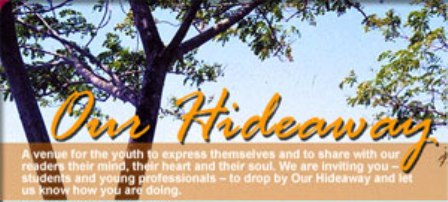
A few months before my trip to Nepal, many of my friends and officemates asked me why I wanted to go to there. Some had no idea where Nepal was. The only thing I could tell them was that I was going to a country where you can find Mt Everest. I also asked myself why I would go on this trip. So many reasons came out: I deserved a vacation and I loved sightseeing, I was also looking forward to meeting someone there, and I wanted to validate my recent passion for peace work. Sounds exciting, right?
When I arrived in Kathmandu, Nepal, on 24 February this year my friend fetched me, and after resting for a while we went to The Bhimsen Tower or Dharahara as the locals there call it. It’s a nine-story tower built in AD 1825, named after the first prime minister of Nepal. From the top you can see the whole terrain of Kathmandu Valley and also you can find a statue of Shiva Lingam on the top floor of the tower.
We spent the next day traveling by bus. I found it exciting for the first few hours because of the beautiful mountain scenery. I saw different types of houses that were mostly made of small bricks. Ahhhh! This was the most exciting part, when we had our lunch. I was so shocked with what they served me: one very big plate where there was a big portion of rice, viands, appetizer and soup. I requested just one quarter of their regular serving because that was all I could finish. People were just staring at me looking so confused as if thinking how I could survive eating so little. As expected, the food was spicy but I liked it and it’s healthy.
We arrived in Nepalgunj at around 9pm and spent the night in Siddartha Hotel, a nice and clean place to stay. It’s a newly constructed seven-storey hotel and so far the highest building in Nepalgunj.
We planned a trip to Jumla for the next day but unfortunately the flight was cancelled due to bad weather. So we just went around Nepalgunj, visited a Hindu temple, went to the border between Nepal and India, had some photos taken there, and then visited the construction site of the new office of my friend. Finally, we flew to Jumla District, a mountainous area in western Nepal. The Partnership Aid Center Nepal (PACE-Nepal), a partner NGO of Caritas Nepal, facilitated our Jumla itinerary.
From the time we arrived at Jumla Airport, I felt the glacial wind that seeped into my thick winter jacket, a coldness that I never experienced in my entire life. My hands became numb as we walked towards our destination. That afternoon, riding in a 4-wheel vehicle, we passed between numerous mountains and reached the Karnali Zone. This area was the most affected area during the civil war against the Unified Communist Party of Nepal – Maoist (UCPN-M). Many lives were lost and more than 1000 households were displaced.
After a journey of more than two hours we arrived, but needed to go further by foot to reach the community we were to visit. Unfortunately, I was able to make it only halfway up, as I wasn’t in top physical condition. So I just used my time taking pictures and enjoying the beautiful surroundings while waiting for the others to come down.
Next day we went to a different community, still internally displaced people, traveling on a single motorcycle. This time I reached the top. Around 30 of them, all adults, welcomed us. Then the discussion started with a brief introduction, everybody introducing themselves in their local language, including me! Here’s how I introduced myself:
Ma Pamela Villamor ho (I am Pamela Villamor)
Ma Philippines bata aiko ho (I am from the Philippines)
Ma knushi chu Jumla Ma ayara ani tapai sanga veteran (I am happy meeting you all here in Jumla)
Dhanibat (Thank you)
After that, the forum proper started and several concerns were discussed, such as health and sanitation, the peace and order situation of the community, and the building of a social center cooperative. We talked about how the community might have a self-generating income so that they could return to their hometowns.
I admired the response of the community to the project provided for them. They had the initiative to identify their problems, speak out, and work for possible solutions. They also acknowledged the presence and help of the NGOs. At the same time they help themselves to recover from their current situation. Their only goal is that someday they can return to their own home places and live normally as they had before. It’s good to know that they remain empowered people despite their situation. It makes the work of NGOs easier and meaningful.
What I love most about travelling is when I shop around for pasalubong and souvenirs. Nepal is not a country for shopping but yet I came back to the Philippines with a lot of excess baggage. I have exciting stories to share with my friends, beautiful memories that can put a smile on my face whenever I’m lonely, and a learning experience that will motivate me to become a more responsible and compassionate individual.
I thank God for this privilege to travel and see more of his creation.
Peace By Peace

In spite of everything I still believe that people are really good at heart . . . I see the world gradually being turned into a wilderness, I hear the ever-approaching thunder, which will destroy us too, I can feel the sufferings of millions and yet, if I look up into the heavens, I think that it will all come right... In the meantime, I must uphold my ideals, for perhaps the time will come when I shall be able to carry them out.
An entry in July 1944 from The Diary of a Young Girl. These are the concluding words of the play based on that, The Diary of Anne Frank.

The response to war is to live like brothers and sisters. The response to injustice is to share. The response to despair is a limitless trust and hope. The response to prejudice and hatred is forgiveness. To work for community is to work for humanity. To work for peace is to work for a true political solution; it is to work for the Kingdom of God. It is to work to enable every one to live and taste the secret joys of the human person united to the eternal.
Jean Vanier, Community and Growth

From Mary we learn to surrender to God's will in all things. From Mary we learn to trust even when all hope seems gone. From Mary we learn to love Christ her Son and the Son of God!
Pope John Paul II
Thank you John Paul II, a video by saltandlighttv.org .

Flower
Josefa Segovia (10 October 1891 – 29 March 1957)
You have watered my garden today,
and your blood
will make my flowers grow,
I do not aim to be a rose,
a lily or anything great
or beautiful,
to be admired by people.
A wild flower,
a tiny violet in the fields –
insignificant, simple,
yet tended
by Your own hands.
Many times have I picked
fragrant wild flowers
to present them to my Mother.
She takes with her fingers
my offering of love
to place this at Your feet.
Today, would that
my Mother will pick my flowers –
wild, born in poor soil,
but watered by the
blood of my Redeemer.
Filled with the signs of
Redemption:
fragrance, color, life.
Como florecilla ante mi Jardinero, (Adapted by Teresita Barcelon)

I tried to acquire a fondness for the very poor, and I finally came to like them very much if they were rather good. But I was not satisfied with liking them; I wanted to love all the poor whom I met.
Rose Hawthorne (20 May1851 – 9 July 1926)
Learn more about the extraordinary life of Rose Hawthorne (Mother Alphonsa) here and the Dominican Sisters of Hawthorne, which she founded, here.

Ozamiz Housing Project
By Fr Oli McCrossan
I am pleased to tell you that we have finished our first four houses and the first families have taken up residence in their new homes. The families are all members of the Pedaling to Live project here in Ozamiz City. The project is now six years old and we have 87 tricycles! The housing project is to help the families who live in poor housing on the seafront of this city. It has been their dream to have better living conditions for their children.
On one small area of ground we plan to build 20 houses. The arrangement is ‘rent to own’. The beneficiaries will pay a daily rental of 30 pesos towards ownership of their house.
We are also developing a communal garden and play area as well. Another exciting development is the use of clay, rice hulls (also called ‘rice husks’), rice straw and sawdust in building the walls of the houses. We can save a lot of money and the use of adobe clay makes the houses cool and pleasant to live in. It's a new technology we have learned from Thailand.
Our families are very pleased to move into their new homes. Our thanks go to all our friends who are supporting us, here in the Philippines, in Australia, in Ireland and in the USA.
‘May mercy, peace, justice and generosity fill our hearts as we pray and wait for the Risen One who comes soon!'

To Dance with the Call
An Interview with Lasarusa ‘Martin’ Koroiciri, Columban Seminarian
By Mary Joy Rile
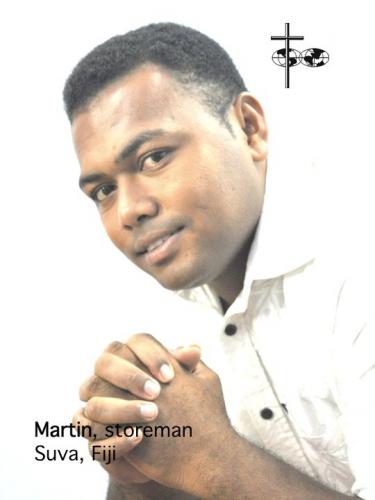 I guess what most interviewers are excited about is the uniqueness of the encounter in every interview, much more if the interviewee is of a different culture. Thus every interview is for me a privilege and a joy. This time, let me tell you about Lasarusa Koroiciri, known as Martin, a Fijian Columban seminarian. Martin is a jolly person and easy to get along with. In conversation with him, I was amazed at his sense of history. Don’t expect me to share historical facts but rather an inspiring vocation story.
I guess what most interviewers are excited about is the uniqueness of the encounter in every interview, much more if the interviewee is of a different culture. Thus every interview is for me a privilege and a joy. This time, let me tell you about Lasarusa Koroiciri, known as Martin, a Fijian Columban seminarian. Martin is a jolly person and easy to get along with. In conversation with him, I was amazed at his sense of history. Don’t expect me to share historical facts but rather an inspiring vocation story.
Martin started by sharing about Columban Fr Martin Dobey who was his parish priest when he was in high school. He observed how Father Dobey dealt with people with his ever ready welcome and how he adapted to Fijian culture. He was speaking with pride as he said that Father Dobey was more Fijian than Irish. The visits of the priest to his home added to his admiration of him as a witness who brought inspiration to the mission where he was living.
Martin was struck by one incident that awakened his interest in the liturgy. One time Fr Dobey fainted in the middle of Mass and was asked to just go home and rest. He was already weak with old age but was eager to continue celebrating the Mass. ‘I'd rather die at this altar before the Eucharist than go' were his striking words that brought Martin to realize how the priest drew strength from the Eucharist. Fr Dobey gave the celebration of the Holy Mass a new meaning to Martin.
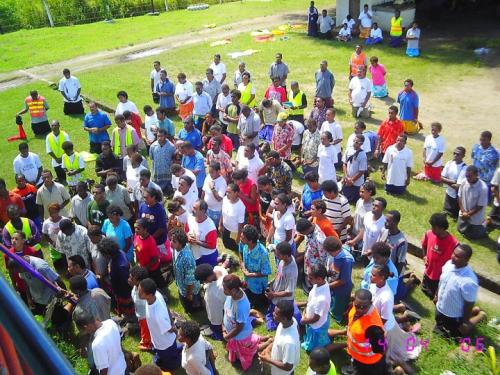
Fiji, Cross Walk 2006
The value of the Eucharsist was instilled in Martin through the inspiration of Fr Dobey. It brought him closer to the One Who is mysterious yet living in the person of Christ. I commended him when he said that the life of the Eucharist and the life that we live are the same thing. It is not just a meal we receive on Sundays but rather the climax of our daily life. I liked the imagery he used in trying to describe the value of the Eucharist in bringing about the transformation of the communicant. He compared us human beings to the face on one side of a coin. Polishing it allows us to see no longer the face there but a reflection of the face of Christ. We are invited to be like Christ, 'until Christ is formed in us.'
Martin with Columban Frs Dominic Nolan, Frank Carey, Brian Gore (all Australians) and Fr Seán Coyle, editor.
Eyeing where God must be leading him, Martin joined the Missionary Society of St Columban in 2008. He is inspired by the mottos lived by St Columban, 'Christi simus non nostri’ and ‘Peregrinari pro Christo,' 'Let us be of Christ, not of ourselves’; ‘To be a pilgrim for Christ.' These motivate him as he sees them present in what the Columbans are doing. He is inspired by the way the Columbans share together their dedication and love for people, by their commitment and daily works. Their history tells of their option for inculturation, going to the people and doing what Christ wants them to do rather than converting the people to their way of thinking. His belief in the Columban community was strengthened by the words of his formator Fr Michael Mohally, 'It's not about joining but about living the charism, living the Christ in us.'
When told his spiritual year would be in the Philippines, he was happy and excited as he had not expected this. He is the only Fijian in the batch. When asked of his expectations before coming here, he mentioned three things: the challenge of eating balut, to visit Smokey Mountain as he was aware of the touching experiences of some Fijians who had gone there, and to see a lot of playgrounds as they only have a few in Fiji.
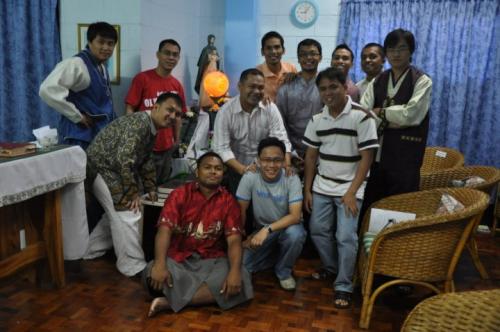
Martin with fellow seminarians
He arrived in Manila on 17 May 2010. Fr Darwin Bayaca, the first Filipino Rector of the Formation Program, and Lanieta ‘Lani’ Tamatawale, a Columban lay missionary from Fiji, met him at the airport. He was surprised at the amount of traffic. The huge buildings made him feel like an ant. He was amused at the country's large population as there are only around one million in Fiji. Standing in a mall at one time, he was puzzled as to where the people were coming from as they popped up from every direction. He also noticed his complexion was different from that of others. These are just a few of the things that led him to deal with his own uniqueness.
Language is always a barrier for those who are starting in a new country. Martin felt embarrassed at times hearing the native language because some of the words seemed to have a rude meaning. He had to take courage just to clarify what some of the words commonly used by Filipinos really meant. He can only laugh at it all now.
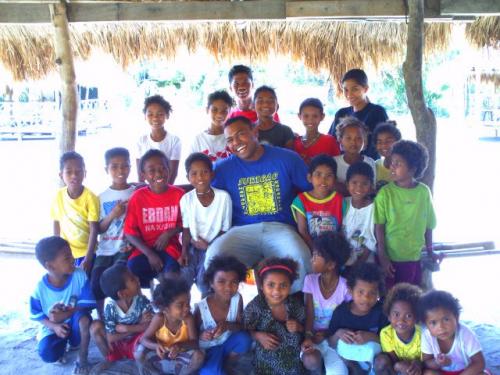
Martin on his exposure in Zambales
He didn’t have a problem adjusting to Filipino food but he observed that people here eat plenty of rice and eat pork almost every day. In Fiji, they are not used to eating rice for breakfast and pork is served only on feast days. They cook it in the lovo, an oven dug in the ground. He has been to a number of places here with Columban connections and hopes to discover more beauty here.
As someone starting his formation journey, I asked him what he hopes and prays for. He shared with me how he was inspired by a text from Thomas Merton written on a stampita of his grand-aunt: 'Lord, lead me blindly on your way. Because if I see I might not follow You.' His words re-echoed in me. I am also in the process of learning how to fully surrender to the will of God and I know this will help me as it does Martin.
‘Who else can know Christ better than Christ?’ Martin’s desire to be molded like Christ himself is motivating him as he hopes to know Him more deeply. Grace will make it happen for Martin, and for all of us. The call to holiness, to be like Christ, is a vocation for all.
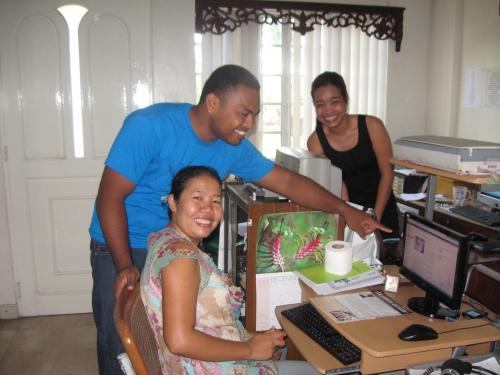
Martin with Misyon staff
I thanked him for his words. I am amazed and grateful at how God uses us as instruments to allow us to learn from each other. For Martin maybe this occasion was just an interview, but for me it became a point of pondering for the coming days. He is walking in the path seemingly unseen for humans but visible to God. In the same way I also follow the calling of my Master.
We each have our own call. We need to learn the art of a meaningful life. To dance with the call is never easy. But the Spirit will grant us the grace to enable us to learn the steps of the rhythm. We simply have to sway with the waves of God’s leading. And Christ himself will be our guide.
Joy and Martin dancing to a South Pacific Beat.
I thought it would be good to have a touch of 'Fijian in a kind' before ending the encounter. By demand, Martin sang so well Isa Lei, a Fijian song. We in the office also requested him to do a Fijian dance though he was hesitant at first. To convince him, we danced along with him as he taught us a few steps to the South Pacific beat. It was a fun way of saying goodbye as he rushed to catch the plane back to Manila.
You may email Martin at martinlkoroiciri@yahoo.com
Update from Columban Lay Missionaries
By Rowena D. Cuanico
There are always exciting happenings at the Columban Lay Missionaries – Philippines, reasons for us to celebrate, rejoice and give thanks.
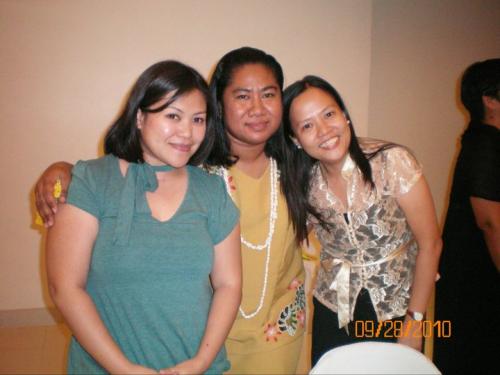
L to R Sherryl Lou Capili, Nanise Mounga, Joan Yap
PH 19, comprised of Joan Yap (Ipil, Zamboanga Sibugay), Sherryl Lou Capili (Silang, Cavite) and Reina Mosqueda (Los Baños, Laguna) have completed their nine-month orientation program. After their commissioning Masses in their home parishes (9 May, 1 May and 8 May respectively) they will go to Taiwan for three years, the first of which will be spent learning Mandarin. As PH 19 implies, Joan, She and Reins belong to the 19th group of Filipino Columban lay missionaries to be sent on overseas mission.
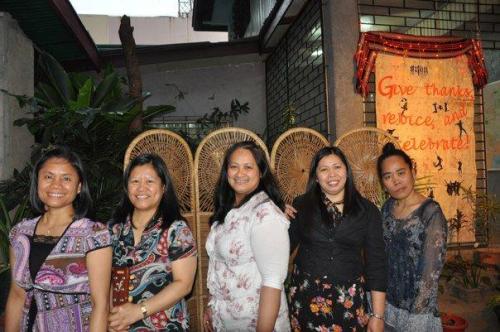
PH17, L to R Virgie Tanate, Marivic Quilab, Marifei Padao, Lenette Toledo and Lorelei Ocaya
We have also welcomed back to the Philippines PH 17 – Lenette Toledo, Marivic Quilab, Virgie Tanate, Marife Padao and Lorelei Ocaya, after three years of missionary work in Ireland. They are currently enjoying their time with their families.
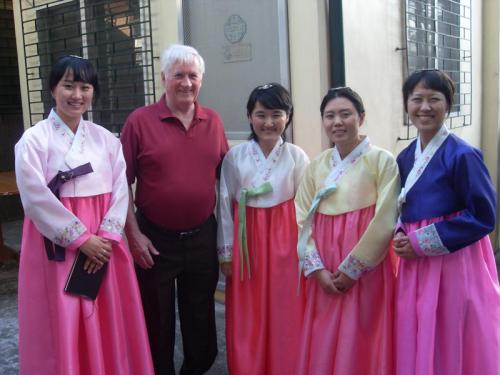
Philippines, new Korean LMs (K13) with Fr Colm McKeating; L to R Noh Hye In, Kim Sun Hee, Park Juri and Shin Hyun Jeong
After nearly 11 years we have welcomed again a new group of Korean lay missionaries. The members of K 13 are Kim Sun Hee, Shin Hyun Jeong, Noh Hye In and Park Juri. Part of their Orientation Program has included sessions on the Columbans in the Philippines, the History of Columban Lay Mission in the Philippines, and the History of the Philippines, during the last of which they visited the National Museum. They participated in the Mass of the Lord’s Supper at Our Lady of Remedies, Malate Parish, and took part in the Visita Iglesia. They have just begun their six-month Tagalog language studies.
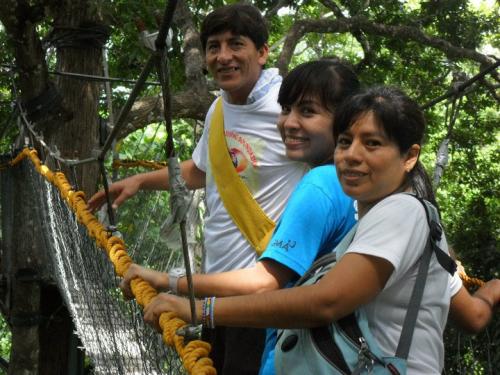
L to R -Antonio Salas Villagomez, Marisol Tomasto, Ana Flores
We also welcomed back Marisol Rojas from Peru for another three years of mission work in the Philippines, particularly in Mindanao. Marisol is currently taking a spirituality course at the Institute of Spirituality – Asia. Ana Belma Flores will be returning to the Philippines after she completes her English studies in Peru.
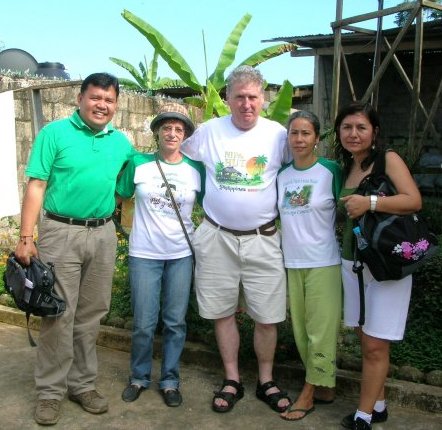
John Din on the left
We greeted with joy and gratitude to God the appointment of John Din as the new LM Coordinator of the Columban Lay Missionaries – Philippines. John, from Dinas, Zamboanga del Sur, has spent six years in Brazil and nearly 12 years in Peru. He also served as a member of the Central Leadership Team of the Columban Lay Missionaries.
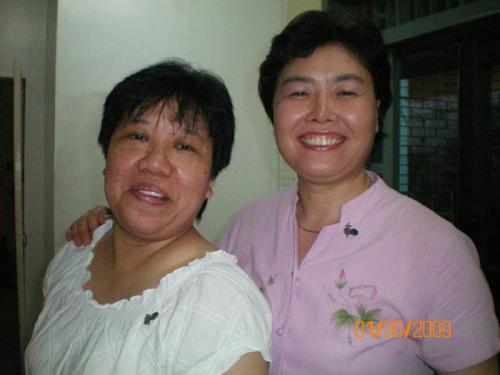
Quezon City, Rowena D. Cuanico and Kyung-Ja Lee
As John returns to the Philippines, Kyung-Ja Lee returns to Korea to be Coordinator of the Columban Lay Missionaries – Korea. Kyung-Ja first arrived in the Philippines in October 2000. She has served in two parishes and has worked with the Migrants’ Ministry. She was a member of the Lay Mission Leadership Team for three years.
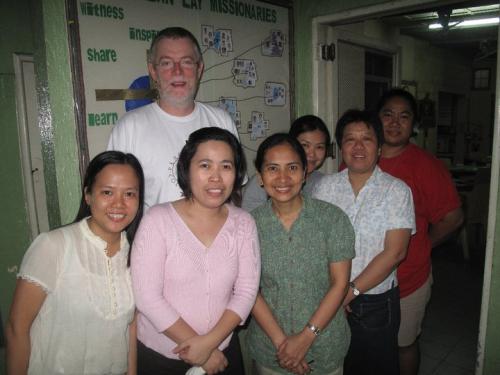
Fr Eamon Sheridan with lay missionaries Joan Yap, Reins Mosqueda, Au Luceno, Sherryl Lou Capili, Rowena Cuanico, Nanise Mo'unga
Nanise Mo’unga from Tonga continues with her various ministries at Our Lady of Peace Parish, Malate. Nani also serves as a member of the Lay Mission Leadership Team. Aurora Luceño is writing her thesis proposal for her masters at the East Asian Pastoral Institute. Au is also doing some volunteer work with the Center for Ignatian Spirituality.
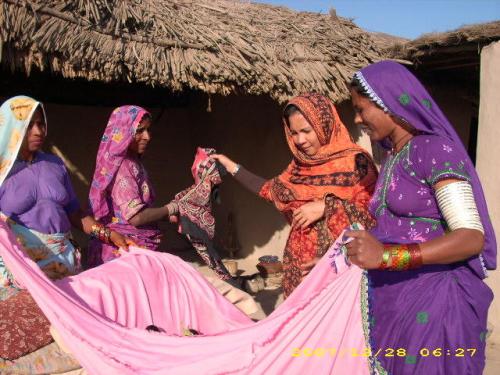
Pakistan, Rowena Cagauauan, now in Fiji
Australian Fr Pat Baker has joined the Lay Mission Leadership Team as priest representative. He brings with him his vast experience in working with lay missionaries particularly in Mindanao.
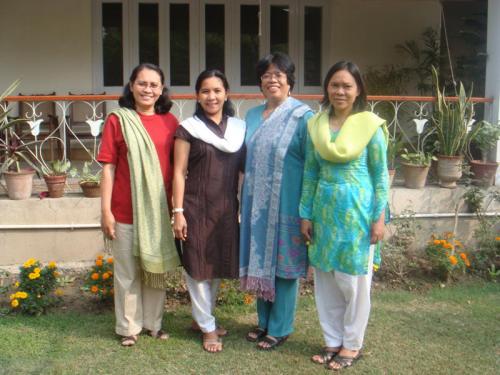
Pakistan, L to R Annie Budiongan, Rowena Cagauauan (now in Fiji), Gloria Canama, Carmela Capistrano.
With these comings and goings, there are also endings. Aniceta Budiongan (Loboc, Bohol) has left after nearly 14 years on mission. She was in Ireland for six years and then spent three years in the Philippines as LM Coordinator. She went to Pakistan in 2007, working with indigenous communities.
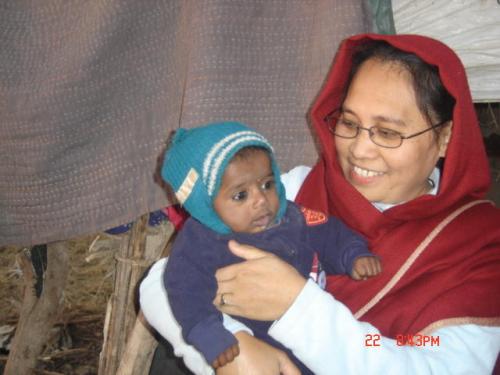
Pakistan, Annie Budiongan
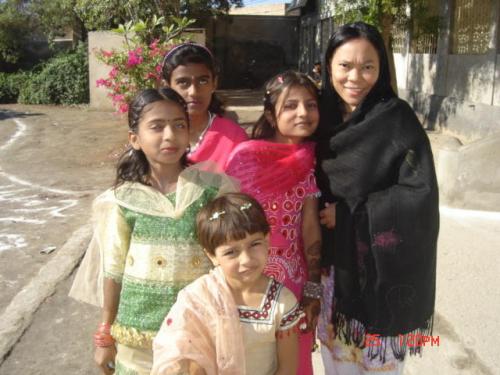
Pakistan, Carmela Capistrano on right.
Ana Carmela Capistrano (Pagadian City, Zamboanga del Sur) has also decided to leave the Columban Lay Missionaries after nearly five years on mission in Pakistan. Annie and Carms were together in the same parish in Badin in Sindh.
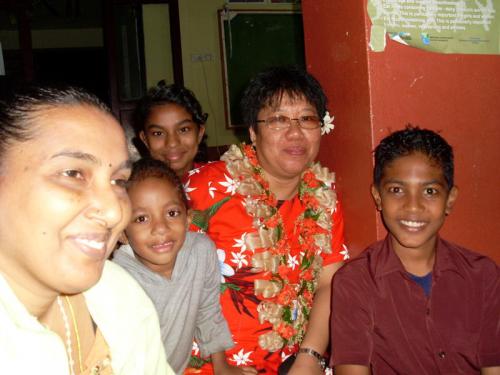
Fiji, Rowena D. Cuanico
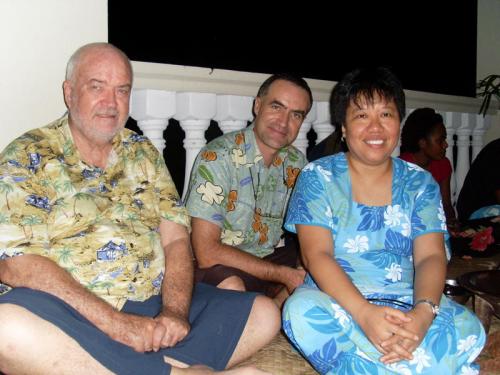
Fiji, Columban Frs David Arms & Patrick Colgan with Rowena D. Cuanico
Rowena Cuanico (Catarman, Northern Samar) will also be finishing her commitment on 31 May. Rowena was in Fiji for nearly eight years. Since June 2008 she has been the LM Coordinator in the Philippines.
When You Learn, Teach; When You Get, Give
By Fr Nicholas Murray
Fr Nicholas Murray died in his native Ireland on 21 April, Holy Thursday, ten days after his 73rd birthday. We first published this article in May-June 2004. The late Father Murray went to China after serving for 12 years as Superior General of the Missionary Society of St Columban. Though he made ‘it very clear that I am a practicing Catholic, to enhance the witness value of my presence’ he found himself in China being a missionary in a very different way from his years in the Philippines where everyone called him ‘Father’. His Chinese students knew him as ‘Mr Nick’.

I’ve been teaching English in a university in Chongging in southwest China since September 2002. I chose to work in this part of China because it is somewhat less developed than the east and the government is now making efforts to develop the west. Chongging is at the center of that effort. I teach Oral English and a course in Western Culture for AB students majoring in English. The latter course in particular affords great scope for communicating values, with topics such as the Bible and Christianity, the Middle Ages, and the Renaissance and Reformation, to name but a few.
Not everybody sees the teaching of English in China as valid missionary work. Some believe I could be more profitably employed elsewhere. My own experience, limited though it still may be, convinces me that it is still eminently worthwhile and truly valid. It’s a new type of mission where all the familiar trappings which we have become accustomed to elsewhere have been stripped away and one is exposed to weakness and vulnerability. In such a situation one has to rely on the witness of one’s life and values, sustained by one’s personal prayer life and the private offering of the Eucharist, sometimes with a few foreign companions. It is fully in line with the Church’s teaching on mission, for the missionary task implies a respectful dialogue with those who do not yet accept the Gospel.
One gradually comes to work out one’s own modus operandi based on experience. I find it profitable to use my opening class to share about myself, my country, my family, my life, my work, my beliefs and values. I use this as a framework around which I build the oral exercises. They like this and it is amazing the amount they can remember about one and what one tells them. I make it very clear that I am a practicing Catholic, to enhance the witness value of my presence. I also lay particular emphasis on my having worked with university students in the Philippines in the area of leadership training.
The witness of presence can be particularly effective. As I have come to realize from personal experience. Some Chinese teachers of English, who employ journal writing as part of their course to the same students I teach, inform me that their students are deeply impressed by my life, work and values and have recorded such admiration in their journaling. One of those same students, actually the brightest in my own classes, one day shared the following reflection in my class. I was so deeply impressed that I asked her to write it out for me. Here is her sharing: ‘Never have I so seriously reflected on the power of religion (it is far from and alien to us Chinese). By sharing life’s journey with us, our Oral English teacher, Mr Nick, aroused my reflection on religion. Now I realize it’s not only a relief from anxiety, distress and grief, but also a motive for one who believes in it to strive to do good deeds; a way to have a noble heart and a remedy for spiritual barrenness. I feel that it is his beliefs that inspire Mr Nick to do what he has done. Now I’m thinking of converting to Christianity, though I’m quite at a loss about how to do it.’
My travels and lifestyle did not escape her attention and reflection either. She went on to say, ‘I could see Mr Nick’s eyes shining and face glowing when he referred to the places where he traveled: the Philippines, Brazil, Japan, Pakistan . . . to name just a few, and now China . . . When his privacy was intruded by a question about his own family he smiled and said, “No one will marry a man who never has enough time for his wife and children.” Now Mr Nick is 65-years-old and forty years have passed since he embarked on his road of serving and helping people. He sticks to the life-long pursuit, the calling, at the price of hardship, marriage and his precious youth (I know how difficult it is to travel around and help people). I was deeply moved when I heard Mr Nick’s answer to the question, “Is there one day when you will stop doing all these things?” “Yes,” he said, “when my health won’t allow it.” I was seized by this simple answer and began to realize how profound the saying is, “When you learn, teach; when you get, give.”’
I find enough inspiration in that simple, honest sharing to keep me going for another few years. It’s but one of the better among many others that help to make my ministry here in China inspiring and worthwhile. In this regard, I’m also encouraged by the advice of one of our co-founders, back in the 1920s, ‘You are not here to convert the people of China, you are here rather to make yourself available to God.’ I believe that helping young people to be more aware and responsible in today’s world is one response in that availability. Maybe you would like to join us for a stint.
You will find an obituary of Father Murray here and a wonderful tribute to him by a classmate, Fr Gerry French who captured the essence of this great missionary when he said ‘He was the natural captain of every team’.
‘I’m here because of him’
By Fr Michael Mohally
The author, from Cork city, Ireland, has spent many years working with Columban seminarians in both Ireland and the Philippines. He continues to do that in Quezon City.
The King’s Speech won four Oscars this year. It tells the true story of how Lionel Logue, an Australian, helped the future King George VI of England overcome a bad stammer. Fr Mohally here tells a story about an Irish priest who helped many, none of them kings and many of them very poor, overcome speech difficulties. In the incident reported here, nobody could have foreseen the consequences, not only in Ireland but in Fiji and the Philippines.
I was confined to bed in the infirmary of our headquarters in Manila and, to keep myself occupied, decided to view a BBC television documentary, first shown on 17 January 1961, about a beloved priest of my native Diocese of Cork, Ireland, Father James Christopher (Christy) O’Flynn. Fr O’Flynn was 80 years old when the documentary was made.
He was famous for helping people overcome speech impediments such as stuttering and introducing young people to Shakespeare through a youth club he had in a loft over a warehouse in his parish.
As I was viewing the documentary an older Columban, who was also confined next door to me in the infirmary section, came to visit me, Fr Paddy Hurley. He is 86 years old and has spent 61 years in the Philippines. As Father Paddy watched the documentary with me he asked ‘Who’s he?’ referring to the priest on the screen. I replied that he was Fr O’Flynn and asked if he had ever met him. He replied, ‘I never met him but I’m here because of him’.
Father Paddy then told me his story.
His father was a young teacher in a village in West Cork, one of the most scenic areas in Ireland. He had difficulty with his voice and had gone to London twice to have it treated, but in vain. He decided to resign his position as a teacher and emigrate to Australia. He went to the village of Durros to tender his resignation to the parish priest and then intended to carry on to the town of Bantry to buy his ticket to Australia. As it happened, the young Fr O’Flynn[ii] was visiting the parish priest and asked Father Paddy’s father not to resign and assured him that he would sort out his voice problem within a week. He did.
Mr Hurley continued teaching. He met and courted Father Paddy’s mother. They married and had ten children, three of whom became Columban missionary priests and a daughter who became a Columban missionary Sister.
Mystery is truly an aspect of our lives. 9 January 2011
There’s a short biographical note on the website of the Diocese of Cork and Ross.
[i] This incident happened on the 8 January 2011 in St Columban’s, Manila.
[ii] Father Paddy’s father graduated as a teacher around 1900. Fr. O’Flynn was ordained in 1909. So I think we’re talking about an incident that happened about 100 years ago.
The Luck of the Irish
By Fr Patrick Hurley
Fr Patrick Hurley is one of four siblings who became Columbans. Fathers Dermot and Gerard, now deceased, worked in Fiji for many years. Sr Catherine, who has served in the Philippines and in Chile, is a former Superior General of the Columban Sisters. Father Paddy, as he is known, worked in Negros Occidental from 1950 until last year. He is now retired in Manila, after breaking his hip in a fall the day before he was to fly to Ireland on vacation.
Fr Michael Mohally’s story gives us a glimpse of God’s loving and mysterious ways in terms of our life’s vocation. Here, Father Hurley tells of being blessed by God in another way.
The other part of the story is that the first Bishop of Kabankalan Diocese, Bishop Vicente M. Navarra, now Bishop of Bacolod, from which Kabankalan was taken in 1987, was building a bishop’s residence.
What was the connection, you may say?
The Bishop needed funds to build his new house and requested financial help from his flock. I had been working in the area since 1950. When I learned that my good Where did this story start? At two far-apart spots in the world.
A first cousin of mine, an old lady and retired doctor, Dra Rena McGovern, died in Birmingham, England, and left me £200, at the time worth about P9,000.
relative had left me some money in her will, I decided to give it as a donation towards the construction of the new house for the bishop. On second thoughts, as he was having a raffle to raise funds, I decided to buy tickets instead.
So I bought about thirty tickets at P300 each and, lo and behold, I won First Prize, a brand new Nissan Sentra car.
As I was living in a faraway place with bad roads, my parish was no place for a nice new car. So I sold it at once, As the bishop’s funds were still lacking, he held a smaller raffle, sweepstakes style, with cash prizes. Each ticket had five shares. If you bought only one share you only got 1/5 of the prize, etc. I decided to invest my original P9,000 in this second raffle. I bought part shares in many tickets and again, lo and behold, out of the eight cash prizes I won parts of three:
a) Third Prize P10,000 – I had two shares – so 2/5 of P10,000 = P4,000.
b) Consolation Prize P5,000 – three shares – so 3/5 of P5,000 = P3,000.
c) Consolation Prize P5,000 – two shares – so 2/5 of P5,000 = P2,000
Total = P9,000.
So my P9,000 came back to me. Then to finish off the house, Bishop Navarra decided on another raffle – this time for motorcycles, etc. as prizes. I felt I should help in the buying of prizes, seeing I had won the car, so I donated P60,000 to the bishop and told him that this could buy two small motorcycles and two bicycles if he wished. But his committee decided to buy two bigger motorcycles and a few extra items such as sewing machines, refrigerators, etc. The tickets cost P100 each. So again, I decided to invest my original P9,000, which bought 90 tickets.
A few days before the raffle, I submitted all stubs and cash to the bishop. But when I returned to my faraway parish, I found eight tickets in my office that I had overlooked. I was going to throw them away but decided to buy them, as there was a priest going to the bishop. I got the tickets quickly, wrote my name on three, that of our Catholic school on three, our local Sisters on one and that of my own sister, Columban Sister Catherine Hurley in far away Chile, on the last. The stubs got to the Bishop on the morning of the raffle and were included in the draw. These tickets were numbered from 7881 to 7888.
They system of drawing was as follows: there was a master-list with all sold tickets and names of donors. Then there was a raffle drum with table tennis balls numbered from 0 to 9, four balls to be drawn for each prize. The numbers were drawn in public and written on a big blackboard. 7-8-8 were the first three numbers drawn for the First Prize. So the final number, unless it was 9, would decide which one of us would win – the school, my sister, the local Sisters or myself. Again, lo and behold, out comes No.6 for ticket 7886, which was in my name. So again, I won First Prize, a brand new motorcycle, costing about P60,000, which is what I gave as a donation for prizes. So again my money came back to me.
I was too old to ride a big motorcycle, so I sold it on the spot. Actually, I only rode a motorcycle once in my life, nearly 50 years ago, traveled only 30 meters and spent six weeks in hospital in Manila.
Your Turn

Response to Who Will Console Consuelo?
By Lucille Arcedas
I have just read the article Who Will Console Consuelo? and it really touched me. There are many Consuelos around but sometimes I fail to recognize them because self-righteousness dominates me.
I once asked Miladdie, who served in the prison apostolate in Kabankalan City, Negros Occidental, where we are both from, if she wasn’t afraid of the prisoners. She told to me how nice these people are.
Later, our organization, Bukas Loob sa Diyos, took charge of the Mass on the fourth Sunday of every month at the jail, followed by Bible sharing with the inmates. As a member, I joined them at the time when I was still employed in NSCA-Ilog.
Truly, there is goodness in every person and the prisoners’ sharing was very reflective. They might have committed sins in the past but we also have the Christian duty to help them, as they too are our brothers and siblings in Christ. They might be physically chained by bars but they have the freedom to live anew and become productive in their own way. After all, not all of them are the real culprits . . .
You can find Who Will Console Consuelo? here. There is a video version here.
You can find Lucille on Facebook.
To Search is To Find

Why should I go to confession?
Watch Get Clean, a one-minute video on why we need to go to confession. Or read about it here.
Here are seven reasons from the blog of Taylor Marshall who was a priest in the Episcopalian (Anglican) Church before becoming a Catholic.
1. Priestly absolution is an awesome gift that Jesus gave us.
Jesus gave us this Sacrament and wants us to enjoy His grace through it. He told His first priests, the Apostles: Receive the Holy Spirit. If you forgive the sins of any, their sins are forgiven (John 20:22). Christ gave us this rite of grace and forgiveness because He loves us. It is a divine gift of mercy and love.
2. You are a sinner.
You are a sinner and you need to examine the sinful patterns of your heart and have a priest give you absolution, counsel, and penance. We are often not honest with our hearts and it takes an objective ‘physician of souls’ to help diagnose you spiritually.
3. Confession is a means of grace.
It is not scary, it is peaceful. We get excited over baptisms, weddings, and ordinations. Why not the remedy for our greatest Christian struggle? Why not be excited about Christ's forgiveness being declared by His appointed deputies - the priests of His Church.
4. You may have committed mortal sin.
There is such a thing as mortal sin:
If any one sees his brother committing what is not a mortal sin, he will ask, and God will give him life for those whose sin is not mortal. There is sin which is mortal. (1 John 5:16)
Mortal sin is deadly and it separates our souls from the pure eternal life that exists within
the Blessed Trinity. Contrition and priestly absolution restores our hearts to a position of love toward God and our neighbors.
5. Guilt is unpleasant.
Often Satan weighs us down with guilt. Guilt can be a good thing if we transform it into repentance. Of course, Satan hates this and God and the angels love it. So free yourself from guilt and hear a tangible person with spiritual authority say, ‘I absolve thee in the name of the
Father and of the Son and of the Holy Spirit’.
6. Confession unites you more fully to the Church.
When you make your confession to a priest, you acknowledge that you have sinned not only against God, but against every single other Christian because by your sin you have lessened the universal witness of every single Christian. You have given the non-believer the excuse that ‘All
Christians are hypocrites’. When you go to Confession you acknowledge that you have caused every Christian to suffer by your sins.
If one member suffers, all suffer together; if one member is honored, all rejoice together. (1 Cor 12:26)
The priest, who represents both God and the Church by his ordination and office receives your repentance and you have the assurance of not only God's forgiveness, but the implicit forgiveness of the entire Church.
7. Receiving the Eucharist becomes even more powerful.
Holy Communion is also one of the Seven Sacraments. When you receive communion you receive the true Body, Blood, Soul and Divinity of Christ our Redeemer. When you confess your sins in a sacramental way, you also have a stronger sacramental union with Christ in the Eucharist. Also, if you are living in mortal sin, you should NEVER receive the Eucharist because you blaspheme Christ and set yourself up for greater judgment and eternal damnation!
Confession Before Communion; where does the Bible show the need for Confession?
‘According to our Church doctrine, if one has committed mortal sin, he needs to go to confession first before taking Holy Communion. In our Holy Mass, in the penitential rite, we already make an act of contrition. I would like to know why it is not enough. Can you please show me where in the Bible does it say that we need confession first before taking Communion’.
The Catechism of the Catholic Church, No 1444, gives the essential biblical authority for the sacrament of Reconciliation/Penance/Confession: In imparting to his apostles his own power to forgive sins the Lord also gives them the authority to reconcile sinners with the Church. This ecclesial dimension of their task is expressed most notably in Christ's solemn words to Simon Peter: ‘I will give you the keys of the kingdom of heaven, and whatever you bind on earth shall be bound in heaven, and whatever you loose on earth shall be loosed in heaven.’ ‘The office of binding and loosing which was given to Peter was also assigned to the college of the apostles united to its head.’
You can find a fuller treatment of the question in the Catechism here.
St Paul says in 1 Corinthians 11;27, Whoever, therefore, eats the bread or drinks the cup of the Lord in an unworthy manner will be guilty of profaning the body and blood of the Lord.
When we have committed a mortal sin, ie, involving grave matter, done with full knowledge and full consent, we have broken off our relationship with God. God has given us the sacrament of confession as the means of being reconciled with him and with the Church. We cannot receive the Body of Christ in Holy Communion without first having our grave sins forgiven. We would not dare attend a wedding, for example, if we were covered in mud and our clothes in tatters.
When we have committed venial sins we may go to Holy Communion without first having gone to confession, though we should confess our sins regularly. Otherwise we become, in terms of our spiritual life, like someone who doesn't take a shower for a long time, or maybe never!
+++
The question raises two other points. The penitential rite at the beginning of Mass is not a celebration of the sacrament of reconciliation/penance/confession but a preparation for listening to the word of God, taking part in the sacrifice of Jesus and receiving him in Holy Communion, if that is our intention.
The other point is the implication that the Bible comes chronologically before the Church. This is not so. The Hebrew Bible, which we call the Old Testament, was accepted by the Church as the Bible along with the books of what we call the New Testament. There were other books that weren't accepted as part of the latter, eg, the Gospel of St Thomas. Here is an extract from The Catechism of the Catholic Church:
120 It was by the apostolic Tradition that the Church discerned which writings are to be included in the list of the sacred books. This complete list is called the canon of Scripture. It includes 46 books for the Old Testament (45 if we count Jeremiah and Lamentations as one) and 27 for the New.